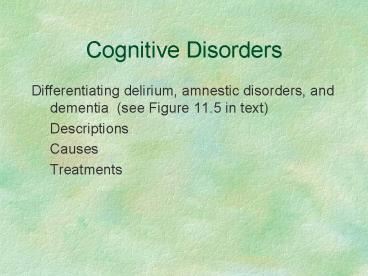Cognitive Disorders PowerPoint PPT Presentation
1 / 15
Title: Cognitive Disorders
1
Cognitive Disorders
- Differentiating delirium, amnestic disorders, and
dementia (see Figure 11.5 in text) - Descriptions
- Causes
- Treatments
2
DSM-IV Criteria for Cognitive Disorders
- Delirium cloudy consciousness with
disorientation, memory deficits, perceptual
disturbances, language deficits - - Rapid onset
- - Short duration
- - Sometimes lucid, other times impaired
- - Personality is unchanged
- - Hallucinations/delusions common
- - Anxious and fearful during disorientation
3
DSM-IV Criteria for Delirium
- Disturbance of consciousness, reduced ability to
focus, sustain, or shift attention - Change in cognition, memory, or language, not
explained by preexisting, evolving dementia - Disturbance develops over short period (hours or
days)
4
Causes of Delirium
- Brain tumors
- Blows to the head
- Systemic diseases
- Intoxication
- Withdrawal from certain drugs
- Severe stress
- Sleep deprivation
- Sensory deprivation
- Forced immobilization
5
Examples and Treatments of Delirium
- Examples
- Seen in 10-15 of ER patients
- Seen during substance intoxification/
withdrawal - Sheets are crawling with bugs
- Police are running through the house
- Treatments
- Remove the cause tumor, drug in system, severe
stress or sleep deprivation, and symptoms
typically disappear
6
DSM-IV Criteria for Cognitive Disorders
- Amnestic disorders loss of past memories,
inability to form new ones - Always have a known cause medical condition or
substance i.e., Korsakoffs Syndrome resulting
from prolonged alcohol abuse - May have the experience of constanting meeting
new people or having new situations because they
fail to form new memories
7
DSM-IV Criteria for Amnestic Disorders
- Development of memory impairment manifested by
inability to learn new information, inability to
recall old information - Memory disturbance causes impairment in
functioning - Memory disturbance does not occur during delirium
or dementia
8
Causes of Amnestic Disorders
- Traumatic brain injury
- Stroke
- Exposure to toxic substances
- Brain disease
- Chronic substance abuse
- Nutritional deficiency (vitamin B1)
9
DSM-IV Criteria for Cognitive Disorders
- Dementia multiple cognitive deficits,
forgetfulness, disorientation, difficulty with
concrete thinking, preservation
10
DSM-IV Criteria for Dementia
- Multiple cognitive deficits and one or more of
the following - Aphasia language disturbance
- Agnosia failure to recognize familiar
objects - Apraxia motor disturbance
11
Types of Dementia
- Vascular dementia caused by stroke
- Substance-induced dementia ie, alcohol
- Dementia due to medical conditions including
- Parkinsons disease dopamine deficiency,
psychomotor slowness - Picks disease frontal/temporal lobe atrophy
leading to disinhibition - Huntingtons disease involves basal ganglia
- HIV disease - subcortical, generalized symptoms
- Creutzfeldt-Jakob disease slow growing virus
- Head injury, brain disease
- Dementia of Alzheimers type (DAT) diagnosed
only by exclusion of other causes
12
Tools in Diagnosing Dementia
- CT scan cross-sectional images of brain
- MRI picture of brain structure created through
magnetic images - PET scans uses radioactive glucose metabolism
to visualize activity level of brain - SPECT scans monitors brain activity by
examining blood flow
13
Facts About Dementia
- Alzheimers (DAT) is most common, accounting for
50 of all cases - Prevalence increases with age
- 1 percent at age 65 years
- Over 10 percent by late 80s
- More common in women and lower SES groups
- By the year 2040, 9 million people in the U.S.
will suffer from dementia
14
Typical Progression of Dementia
- Mild memory disturbance and forgetfulness (often
unrecognized or covered up initially) - New learning is impacted
- Recent memories fade, confusion over daily
activities, meals - Distant memories fade, including familiar family
or friends - Personality changes including irritability, depres
sion, - childish behaviors
- Confusion, disorientation, aphasia, apraxia,
agnosia - Loss of control of bodily functions (infantalized)
15
Treatment of Dementia
- Goals
- Preserve independence self esteem
- Keep up social contacts
- Provide as much enjoyment meaning as
possible - Medications e.g., Aricept (slows progression)
- Modifications to environments to promote
independence - Hand rails for apraxia
- Labeling things to organize/address
forgetfulness - Use community services like meals on wheels

